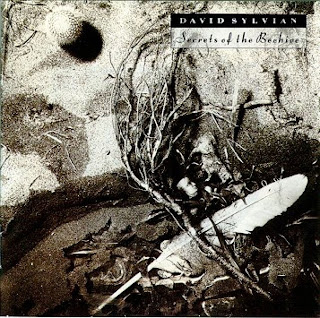+-+Front+cover.jpg)
Il concetto che sta alla base dell’album rappresenta una variazione di un tema spesso utilizzato nella musica rock e nell’arte: il succedersi, nel tempo, di tre generazioni di una famiglia. Tuttavia, non si tratta di tre generazioni consecutive: la prima appartiene alla preistoria, la seconda al periodo industriale (grosso modo, l’era attuale), mentre la terza è inevitabilmente proiettata nel futuro. Ovo è il componente più giovane della famiglia - un bambino venuto alla luce nel mondo enigmatico dei suoi genitori e nonni.
Per quanto riguarda la musica, risulta evidente fin dall’inizio che “Ovo” attinge generosamente a quei suoni del "Real world" così tanto approfonditi e adorati da Gabriel da molti anni a questa parte. Non a caso, l’elenco dei musicisti che hanno partecipato alla realizzazione del disco (es. Ravi Shankar, Tony Levin e Richie Havens) sottolinea l’eterogeneità delle timbriche sulle quali si basa l’album.
Un album che sorprende ad un singolo brano. Si passa da una tipica ‘reel’ in stile celtico ("The weaver's reel") ad un’interpretazione vocale soft e introspettiva ("Father, son") e, quindi, ad un pezzo di rock duro vero e proprio ("The tower that ate people") in perfetto stile “Sledgehammer”.
Nelle altre parti dell’album balzano in evidenza i ritmi e le sonorità etniche (con tanto di utilizzo di ‘didgeridoo’). Molti dei brani sono strumentali ispirati a generi diversi (es. "White ashes", con il suo curioso mix di ritmi africani e parti vocali borbottate, il tutto su un continuo va-e-vieni di sintetizzatori). Il brano conclusivo “Make tomorrow” è uno dei più lunghi composti da Gabriel e raduna gran parte dei musicisti presenti nell’album, dando vita ad un grandioso finale.
Pur essendo una sorta di colonna sonora, “Ovo” è un album davvero ‘tosto’: personalmente, lo preferisco a molti degli album solisti pubblicati dall’ex-leader dei Genesis. L’eterogeneità delle musiche, la presenza di artisti di massimo livello e la solidità delle composizioni contribuiscono alla resa di quello che classifico come un ottimo album.
The concept lying at the basis of this album is a variation on an ofted used theme, looking at three generations of a family. These are not consecutive generations: the first is from he prehistoric era, the second from the industrial period (approximately now), and the third, inevitably, in the future. Ovo is the youngest of the family, an infant born into the enigmatic world of his parents and grandparents.
So much for the concept, what of the music? Right from the start it is clear that "Ovo" leans heavily on the "Real world" sounds which Gabriel has investigated and nurtured for many years. A glance at the line-up reveals that such renown musicians as Ravi Shankar, Tony Levin, and Richie Havens have all contributed to the diverse sounds on which the album is built.
There really is something for everyone here. One minute we are being uplifted by a Celtic reel ("The weaver's reel"), the next we have a delicate Gabriel vocal song ("Father, son") and, no sooner that has finished, we have a "Sledgehammer"-type piece of heavy rock ("The tower that ate people").
Elsewhere, ethnic rhythms come to the fore (including didgeridoos). Several of the tracks are instrumentals of various styles, e.g. "White ashes" with its curious mix of African type rhythms and mumbled vocalizing, with synthesizer effects drifting in and out. The album closes with one of Gabriel's longest songs ever: "Make tomorrow". The piece brings together many of the musicians who have graced previous tracks in a slightly understated but highly effective finale.
Despite being a sort of soundtrack, “Ovo” is a very strong album. I actually find myself preferring this to some of Gabriel's official solo releases. The enormous diversity of the music, the engaging of top musicians, and the strength of the compositions combine to result in a very good album.







+-+Front+cover.jpg)






+-+Front+cover.jpg)
+-+Front+cover.jpg)

+-+Front+cover.jpg)
+-+Front+cover.jpg)




















